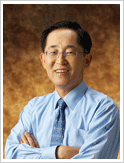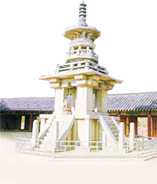 |
|
 |
|
 On behalf of the ICC 2005 Executive Committee, I am pleased to On behalf of the ICC 2005 Executive Committee, I am pleased to
invite you to the 40th annual IEEE International Conference on
Communications, which will be held in Seoul, Korea during 16-20
May 2005.
Today, the major trend of telecommunication networks and
services is ¡®convergence¡¯ and ¡®seamless provision.¡¯ Reflecting this trend, we chose ¡®towards the era of ubiquitous networks¡¯ as the theme of ICC 2005. Under this theme, ICC 2005 will feature the latest developments in telecommunications from a technical perspective and discuss likely trends with leading technical specialists from all over the world. At the same time, influential business figures will be invited to add business flavor to ICC 2005. Thus please join us and exchange your innovative ideas and rich experience with other distinguished participants across the world. |
|
| As it is the first time ICC conference is held in Asia, I am very honored to host it in Korea. Seoul, where ICC 2005 is held, is not only political, cultural, and commercial center of Korea, but also a historic city as an ancient capital of the Chosun Dynasty (1392- 1910) with many tourist attractions such as old palaces and gardens. By participating in ICC 2005, you will be able to enjoy both the flavor of traditional Korean culture and the excitement of a sprawling metropolitan city. You will also be able to eye witness a splendid development of broadband Internet in Korea and various trial tests of future services. Thus we urge you to capitalize on this golden opportunity of attending ICC 2005. |
|
| Once again, I am very pleased to invite you to ICC 2005 and look forward to meeting you in Seoul in May 2005. |
|
 |
 |
Dr. Yong-Kyung Lee
General Chairman of ICC 2005
President & CEO, KT Corp. |
|
|
|
 On behalf of the Technical Program Committee of ICC 2005, I am honoured to invite you to Seoul and to a diverse set of technical programs to be offered in ICC 2005. On behalf of the Technical Program Committee of ICC 2005, I am honoured to invite you to Seoul and to a diverse set of technical programs to be offered in ICC 2005.
The advancement of communication technologies has been leading the development of industry of the world and the evolution of social life of mankind. This trend has been accelerating in recent years with the prosperity of broadband, multimedia, wireless, optical, and Internet communication technologies. With the maturity of those communication technologies in conjunction with the enhancement of the relevant network and service technologies, we now see ourselves moving towards the new era of ubiquitous networking today.
Such a strong influence of communication technologies to industry and social life has been culminating in Korea during the past decade. As cited frequently, the subscription of broadband Internet access has reached 12 million households (76%) and the subscription of wireless cellular telephone services has exceeded 37 million individuals (78%). People are curious about such rapid diffusion of new communication technologies and are anxious to know about the reasons behind. Some expert views it triggered by the recent technical success in developing the world-first CDMA communication system; some regards it made possible due to the strong leadership of the government, the Ministry of Information and Communicaitons; some asserts that it is closely related to the densely populated housing pattern of Korean cities, and some guesses it basically originates from the characters of Korean people. Nevertheless, the reason is yet to be investigated in various different angles and, whatever the reason it may be, Korea is now widely accepted as the testbed of new communication technologies and services of the world. ICC 2005 in Seoul will offer to you a unique opportunity to explore the communication industry and business of Korea as well as its 5,000 years old cultures, thereby enabling you to find the answers for yourself.
The technical programs of ICC 2005 consists of technical paper presentation sessions, tutorials, and business application sessions.
For the technical paper presentation sessions, we have organized one General Conference and eight Symposia, a sum of 2,150 papers were submitted to those nine symposia including general conference. The nine individual TPC teams have worked hard to fairly review the papers, allocating three or more reviewers to each paper. Based on the review data provided by the nine TPCs, ICC 2005 TPC has finally selected the best 692 papers for presentation and publication in ICC 2005, which amounts to about 35% acceptance ratio. The accepted papers will be divided into 16 parallel sessions and presented throughout the middle three days of the conference.
For the tutorials, we have selected 15 best tutorials out of 27 proposals, including five full-day tutorials and 10 half-day tutorials. The subjects of the tutorials cover most fundamental contemporary issues in the fields of broadband communications, next generation networks, wireless communications and networks, UWB communications, ad-hoc networks, radio resource management, service quality, mobility and security.
For the business application sessions (BAS), we have selected 11 sessions that cover the most practical and promising state-of-the-art technologies that are of great interest to competitive communication service providers, vendors, and operators. The subjects of the BAS include broadband wired and wireless access networks, competition of 3G and Wi-Fi, broadband services and applications, convergence of broadcasting and telecommunications, challenges of mobile communications industry, impacts of communication standards, Internet technologies for communication, home electronics and networks, sensor and ad-hoc networks, and radio spectrum policy.
With such full-fledged technical programs, I believe ICC 2005 will fully satisfy all the participants "technically". I am very pleased and feel confident to invite you to ICC 2005. Please come to Korea and explore the secret behind the big success of Korean communication business and industry as well as its attractive culture. I look forward to seeing you in Seoul in May! |
|
|
|
 |
 |
Byeong Gi Lee
Technical Program Chair, ICC 2005
Professor of Seoul National University |
|
|
 |
|
|
